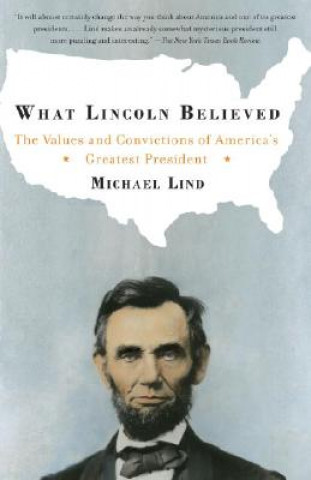
Code: 12050655
What Lincoln Believed: The Values and Convictions of America's Greatest President
by Michael Lind
Few biographers and historians have taken Lincoln's ideas seriously or placed him in the context of major intellectual traditions. In "What Lincoln Believed, the most comprehensive study ever written of the thought of America's mo ... more
- Language:
 English
English - Binding: Paperback
- Number of pages: 358
Publisher: ANCHOR, 2006
- More about this

102.41 zł
RRP: 103.48 zł
You save 1.07 zł

In stock at our supplier
Shipping in 14 - 18 days
You might also like
-

Hummingbird on the Left
90.57 zł -5 % -

Twinkle, a Christmas Story
61.93 zł -1 % -

Lawrence Police Department
104.64 zł -7 % -

The Life and Adventures of John A. Murrell, the Great Western Land Pirate
145.22 zł -

God Chasers: Interactive Study Guide
74.98 zł -

She Who Remembers
56.77 zł -

Plainsboro
104.64 zł -7 %
Give this book as a present today
- Order book and choose Gift Order.
- We will send you book gift voucher at once. You can give it out to anyone.
- Book will be send to donee, nothing more to care about.
More about What Lincoln Believed: The Values and Convictions of America's Greatest President
You get 59 loyalty points
 Book synopsis
Book synopsis
Few biographers and historians have taken Lincoln's ideas seriously or placed him in the context of major intellectual traditions. In "What Lincoln Believed, the most comprehensive study ever written of the thought of America's most revered president, Michael Lind provides a resource to the public philosophy that guided Lincoln as a statesman and shaped the United States. Although he is often presented as an idealist dedicated to political abstractions, Lincoln was a pragmatic politician with a lifelong interest in science, technology, and economics. Throughout his career he was a disciple of the Kentucky senator Henry Clay, whose "American System" of government support for industrial capitalism Lincoln promoted when he served in the Illinois statehouse, the U.S. Congress, and the White House. Today Lincoln is remembered for his opposition to slavery and his leadership in guiding the Union to victory in the Civil War. But Lincoln's thinking about these subjects is widely misunderstood. His deep opposition to slavery was rooted in his allegiance to the ideals of the American Revolution. Only late in his life, however, did Lincoln abandon his support for the policy of "colonizing" black Americans abroad, which he derived from Henry Clay and Thomas Jefferson. Lincoln and most of his fellow Republicans opposed the extension of slavery outside of the South because they wanted an all-white West, not a racially integrated society. Although the Great Emancipator was not the Great Integrationist, he was the Great Democrat. In an age in which many argued that only whites were capable of republican government, Lincoln insisted on the universality of human rights and the potential fordemocracy everywhere. In a century in which liberal and democratic revolutions against monarchy and dictatorship in Europe and Latin America repeatedly had failed, Lincoln believed that liberal democracy as a form of government was on trial in the American Civil War. "Our po
 Book details
Book details
102.41 zł
- Full title: What Lincoln Believed: The Values and Convictions of America's Greatest President
- Author: Michael Lind
- Language:
 English
English - Binding: Paperback
- Number of pages: 358
- EAN: 9781400030736
- ISBN: 1400030730
- ID: 12050655
- Publisher: ANCHOR
- Weight: 281 g
- Dimensions: 204 × 133 × 21 mm
- Date of publishing: May 2006
Trending among others
-

Dune
35.21 zł -33 % -

Haunting Adeline
124.88 zł -2 % -

Berserk Deluxe Volume 2
213.64 zł -1 % -

White Nights
15.47 zł -23 % -

Powerless
47.46 zł -14 % -

Atomic Habits
82.98 zł -14 % -

Dune Messiah
46.55 zł -3 % -

Berserk Deluxe Volume 3
221.23 zł -

One Day
32.78 zł -36 % -

Berserk Deluxe Volume 1
212.83 zł -2 % -

Iron Flame
61.42 zł -28 % -

Surrounded by Idiots
52.21 zł -23 % -

Harry Potter and the Prisoner of Azkaban (Minalima Edition)
171.23 zł -2 % -

Gravity Falls Journal 3
89.46 zł -1 % -

Heaven Official's Blessing: Tian Guan Ci Fu (Novel) Vol. 1
89.46 zł -1 % -

The Creative Act
100.69 zł -15 % -

Dune
38.25 zł -38 % -

Hunting Adeline
130.75 zł -1 % -

A Little Life
48.77 zł -12 % -

Children of Dune
46.95 zł -2 % -

Heaven Official's Blessing: Tian Guan Ci Fu (Novel) Vol. 2
96.24 zł -

Bungo Stray Dogs, Vol. 8 (light novel)
69.62 zł -

Percy Jackson and the Olympians 5 Book Paperback Boxed Set
194 zł -1 % -

Solo Leveling, Vol. 1
88.95 zł -1 % -

The Prisoner's Throne
43.61 zł -15 % -

Court of Thorns and Roses
43.61 zł -15 % -

Cry Baby Coloring Book
48.47 zł -

Fourth Wing
55.35 zł -28 % -

Icebreaker
34.30 zł -28 % -

Berserk Deluxe Volume 6
219 zł -

Avatar, the Last Airbender: The Kyoshi Novels (Box Set)
170.02 zł -2 % -

The 48 Laws of Power
101.70 zł -13 % -

House of Leaves
86.22 zł -33 % -

Twisted Lies
36.93 zł -28 % -

Dune Messiah
47.76 zł -23 % -

No Longer Human
69.01 zł -

48 Laws Of Power
86.52 zł -14 % -

Twisted Games
47.46 zł -14 % -

Caraval Paperback Boxed Set
176.39 zł -3 % -

Solo Leveling, Vol. 2
60.51 zł -36 % -

Open Circuits
170.42 zł -2 % -

Berserk Deluxe Volume 5
218.90 zł -

Heaven Official's Blessing: Tian Guan Ci Fu (Novel) Vol. 3
84.30 zł -7 % -

Berserk Deluxe Volume 4
222.85 zł -23 % -

Court of Mist and Fury
43.61 zł -15 % -

SOLO LEVELING V08
88.85 zł -2 % -

English File Upper Intermediate Multipack A (4th)
93.50 zł -1 % -

CHAINSAW MAN V14
43.61 zł -22 % -

Before the Coffee Gets Cold
44.82 zł -13 %
safisfied customers
Since 2008, we have served long line of book lovers, but each of them was always on the first place.
Copyright! ©2008-24 libristo.pl All rights reservedPrivacyPoučení o cookies


 21 million books
21 million books Delivery 12.99 zł
Delivery 12.99 zł (32) 444 93 66 (8-15.30h)
(32) 444 93 66 (8-15.30h)